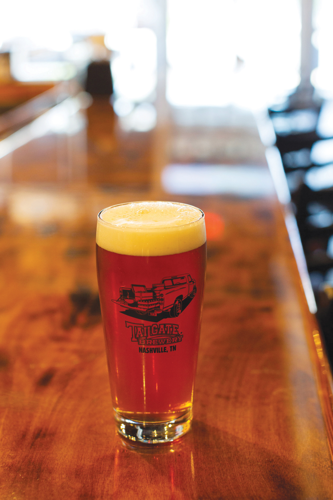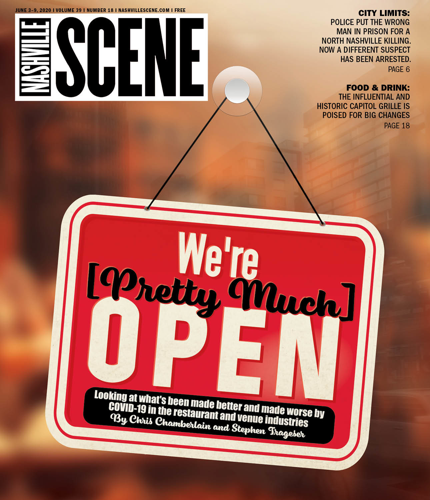This article is part of a two-part cover package on post-COVID recovery. See also: "How Nashville’s Independent Music Venue Ecosystem Can Come Back Stronger."
The Nashville hospitality industry has been hit particularly hard by the one-two punch of COVID-19 and last year’s unimaginable series of disastrous events. As quickly as the dining spigot was cut off by mayoral fiat back in March 2020, it has reopened to a gushing cascade as capacity constraints and mask regulations have been lifted. This has introduced an all-new series of challenges for local food and beverage workers.
It’s easy to assume that some of the things that have gone away — think family-style and buffet dining — will never return. But Monell’s, for instance, is back with full tables around the lazy Susan. Other new aspects of the dining experience — like carryout from fine-dining establishments and the option to buy booze to-go — will probably remain a regular part of the industry, but their future impact on revenue is still an open question. While the rampant issues regarding staffing difficulties are definitely real, how businesses are scrambling to attract workers involves a wide range of potential solutions. To attribute the paucity of available workers to past and future servers sitting on their couches playing video games and cashing their stimulus and unemployment checks — well, that’s beyond reductive.
To find out some of the real answers about where we’ve come and where we might be headed, the Scene spoke with restaurateurs, a brewery owner and other hospitality pros. Their responses reveal the nuances that don’t show up in investigations looking for easy answers to the problems at hand. They also demonstrate just how frustrating it is to essentially reassemble an aircraft that’s flying at Mach 1.
Jim Myers comes at these issues from a unique perspective. He’s a former longtime food and drink writer currently working as the self-described Minister of Culture at the recently opened shiny new location of the classic Elliston Place Soda Shop. As per usual with restaurant openings (and not just ones that happened during the past year-and-change), the date of the shop’s grand debut moved out constantly thanks to construction and permitting delays, capacity issues and staffing difficulties. But now that the soda shop has welcomed streaming crowds of diners who’ve been waiting for a long time, Myers welcomes the challenge. “It’s overwhelming to see people in the space after looking at each other’s faces for so long,” he says. “We’ve been overwhelmed, emotionally and literally, with all the people coming out to eat. As we ease out of COVID, people are finding that they really miss restaurants and common experiences with your feet under a table with friends.”
Q-Juan Taylor — co-owner and partner at both Sinema and 8th & Roast — has also been encouraged by the recent rush of business. “People are so excited about congregating,” he says. “It’s sort of a communion, a celebration of survival.” That said, Taylor’s business is nowhere close to whole again. “I’m seeing a progressive bounce-back,” he explains. “We’ve still got a long way to go for people to feel comfortable with their small businesses. Large events like restaurant buyouts, receptions and private dinners still aren’t happening. It’s nice to see people at four-tops, but dining has changed. We don’t see groups ordering five bottles of wine and paying with their corporate cards.”

Q-Juan Taylor, co-owner and partner at Sinema and 8th & Roast
Wesley Keegan, the owner of TailGate Brewery, made the shrewd decision to diversify his business years ago. In addition to operating a large commercial brewery at his Bellevue headquarters, Keegan has opened additional taprooms in East Nashville and on Music Row. All his locations have robust food programs revolving around pizza, and TailGate’s wide array of crowd-pleasing draft beers and ciders kept his business relatively stable throughout 2020. “We shut down for two months, but carryout saved us as it slowly ramped up until we could reopen for dining in,” he says. “Business wasn’t good, but it was manageable. We were able to keep our people and still give raises throughout the year.”
The fact that all of Keegan’s facilities produce beer and/or cider also meant that they could sell products to go under their brewery license when the city clamped down on Broadway and Midtown establishments that were bad actors. “They just didn’t want Lower Broad to turn into a giant outdoor cocktail party and saw a lot of places that weren’t following the rules,” says Keegan. “Retail spots got left to carry the bag. We had to pay our lawyers and contact our councilmembers to figure it out, but all things considered, the Beer Board was very proactive, and Nashville did a great job. Small businesses are used to figuring out how to survive.”
Along the way, Keegan remained committed to his business. “We saw how people who pivoted to operate within the rules have survived better than those who didn’t. Outdoor dining was really good for us and many of our retail accounts. We have been really aggressive, and we paid for it. We invested in ourselves. If you waited for prices to come down, they just didn’t. If a box of gloves cost 10 times more than it used to, we just ponied up if it made our guests more comfortable. Closing the doors was never an option.”
All four of these businesses have had to address staffing issues that can seem desperate at times. “It’s the 10,000-pound gorilla in the room,” says Myers. “It’s citywide and countrywide. We ran into the perfect storm of everyone trying to open at the same time. We’ve got this fancy new sports car, but we haven’t been able to run it at full-throttle until we can be fully staffed. We thought we would open in January and got great responses to want ads. Then the opening date changed, and all those people were gone when we finally did open. We’ve been using every online venue available to attract people. It’s always been competitive to hire in Nashville, but this feels really different. It’s naive to think that the added government benefits don’t play a part in the problem, but people are definitely struggling with child care, and many people have left the sector.”
Taylor agrees and adds a few other factors. “There are three problems, in my opinion,” he says. “A lot of potential employees just aren’t in town anymore. Others simply didn’t come back to the restaurant industry and switched careers. But we really need to address the accessibility to the Metro area for workers in the restaurant industry that can’t live close to where they work. Many of my people live in Madison, Antioch and Hendersonville. We have to find solutions to affordable housing, because they can’t afford to live near Sinema.”

Tailgate Brewery
From Keegan’s perspective, many of the industry’s problems with staffing are self-inflicted. “We had been receiving fewer applications than ever, almost zero over the past few months,” he says. “Then we realized that we hadn’t been doing a good job marketing how we pay and treat our employees. We offer great wages, access to health care, a 401K — things that are pretty unique in our business. We just didn’t do a good job sharing that with potential employees.
“We looked at our online job listings, and all of them were old,” he continues. “It’s probably our fault that we weren’t doing a good job spreading that message. Once we fixed that, we got more applicants than we know what to do with. Now we’re fully staffed and have more than a dozen employees that have been with us longer than five years, which is pretty good when you consider we’ve only been open for six years. Keeping people is more challenging than hiring them. We’ve learned that in order to retain employees, you’ve got to pay them right, treat them right, talk to them and listen to them.”
Keegan goes on: “Consumers are more conscious, and they appreciate businesses that treat their employees right. Our job is to market what we’re about. In a brewery, your highest [profit-and-loss] item is labor, and it should be that way. Investing in yourself pays dividends, but getting there is hard. The life cycle of a small business is great when you’re really small or really big. In between fucking blows.”
Taylor admits that his team threw a lot of spaghetti against the wall to see what would stick to get to where they are now. Sinema opened a small bodega to sell kitchen staples and produce to customers in need, and even operated a ghost-kitchen taco shop online for a little while. Ghost kitchens, for the unfamiliar, are food-prep facilities that are set up for delivery-only meals — and they saw a boom during the pandemic. The restaurant was forced to switch its popular weekend brunch buffet with multiple action stations to a family-style service at the table, but Taylor and his team have been surprised how successful the change has been.
“We’re not going back,” he says. “We’re very proud of how our staff has been so creative coming together to still create a fun interactive experience at the table. You have to figure out what vibe a consumer is seeking out this evening. Is it takeout or dining out? You’ve got to have all those elements. We survived because we have all the things involved in dining. We’re still around and will be lucky to have been here seven years this month. I have great respect for the people who have fought through this and continued to survive with us.”






